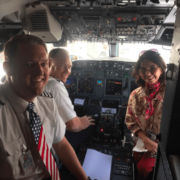WHENEVER I see glossy posters of folks waving happily as they hop on a plane, I realize what a lying society we live in today. Nobody is happy, hanging 35,000 feet in the sky, cocooned inside the belly of a heavy metal container because it does funny things to one’s guts.
Yet every flight begins at the airport. It starts as the ramp agent carefully loads the luggage on the plane to the customer agent helping you out at the ticket counter to the flight attendant giving the flight safety briefing. They all have one thing in common: classified as the celebrated, hardworking toilers behind the scene, trained in excellence and experienced to design, delivering measure in service amid a team of employees of any airline. They are the backrooms of change and development that brainstorm ideas to impress service experience and reduce costs that go back to customers, among other things.
A couple of decades ago, I viewed the airplane as a country club of the clouds — a place where you can unwind and not have an air of worry in the world. People will get their flight insurance in the lobby, go through security and have all their belongings X-rayed for guns and knives before they board the plane. After the attendants have given them the evacuation procedures in the event of the loss of air pressures and demonstrated how to use the life jackets in the event they ditch over water, we were free to relax.
Most of us have a love/hate relationship with airlines. We love them when they are on time; we hate them the rest of the time. But the fact that we climb on and off of them proves that we have not lost our cavalier spirits and we are willing to forget them for just about anything.
I’ve been on a planet where the doors were secured, announcements were made and someone was left, and an important celebrity was left out, inebriated by the VIP lounge. In another incident, the plane could not take off because we’re helplessly stuck on the jettiport and hours later, it would have to be surgically removed from one another. There’s the important little paper — barf bags on the seat pocket with instructions on how to throw up in two languages. You know how it is — traveling can be difficult and stressful.
There are not two people on an airplane who have paid the same price for a ticket. Think about it and it will drive you crazy. Some are relatives of airline employees who pay nothing, some are traveling amassed mileage comps, and some are super savers. But one’s class distinction has remained. In first class are people who are divided from the peasants by a limp blue curtain. I have always wondered when I could write a story when the little people in economy and super savers stormed the limp curtain to protest inequality. How long would they sit there and watch that little curtain being snapped together leaving them suspicious and classless? It is the stuff of which revolutions are made.
First class travel has been a mystique shrouded in fantasy for me when I was younger. I imagined it is a place on the plane where skirts and flight time are shorter, entertainment live, and the bathrooms are large enough to shut the door without standing on the seat.
Some people imagine women with tiaras, large bosoms, and lace fans throwing back their heads and laughing “Let them eat stale sheet cakes and green noodles back there.” But the irony is that the limp curtain dividing first class from economy was never to keep the tourists in the dark. It is for the first class passengers so that they won’t know that their cocktails service is longer so attendants can get the passengers in economy served first even if they are paying twice the fare.
I am not minimizing security. It is a major concern of all airlines and we take it as seriously as they do. We are all released of “weapons” — my needle point scissors that couldn’t cut hot butter taken from me for “self-keeping,” when my cosmetic case probably have more potentials for exploding.
Pilots spend most of their time in the clouds, 35,000 feet above sea level. I had a sparkling conversation with Captain Doyle Hill and 1st officer Darren Murphy on a recent trip from Lake Tahoe. I would learn that airlines’ flexibility is a huge lifesaver. Instead of waiting and sifting at your gates for home, go for a walk thus burning calories and improves your mood and state of mind.
He added that for more than two decades, the airline’s staff members have all been excellently trained for outstanding service and have celebrated a hard working, behind the scenes team, amidst a sea of employees. They have wonderful workshop groups of coordinators and schedules from various departments with one team with the purpose of collaborating company initiations that provide consistency in scheduling, that continuously improve their process building a community of best processes.
Hill said, “It is the hospitable approach to ensure the ultimate training experience for customers…and this year, the airlines, SWA – U team got the ‘Heroes of the Heart Award.’”
Murphy said he “believes that a community is more than a place – it is the heart that brings us together, that takes care of people, that makes the airline different, in this are ways what brings us together.”
Hill added “It is not enough, just to respect diversity, you have to embrace it. The Golden Rule drives our efforts: It is one unified voice…as we recognize others, earn best practices. We don’t just give back – it gives forward as we help each other, distance and difference shouldn’t keep us from our neighbors, and it starts on my plane.”
Until the next plane ride.






